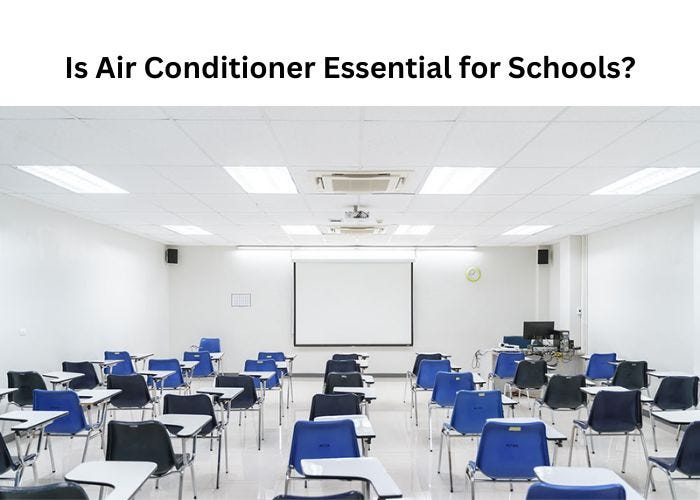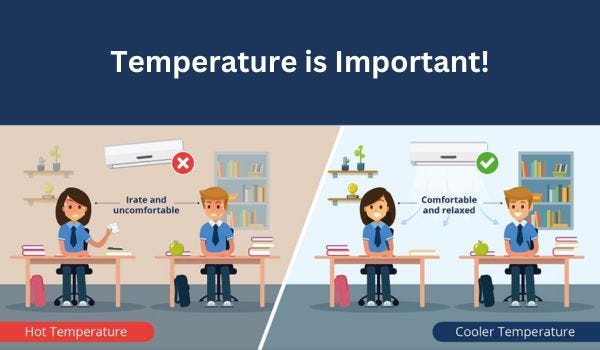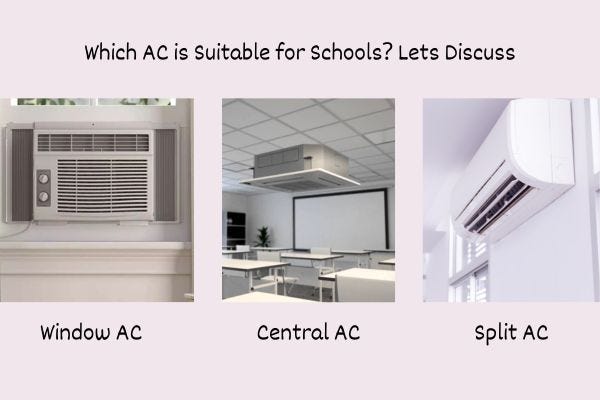Is Air Conditioner Essential for Schools? Let's Discuss!


Creating a comfortable learning environment is crucial for student focus, achievement, and well-being. But does that make the air conditioner essential for school?
Yes, in today's rapidly changing climate air conditioners have indeed become an essential item for school. AC creates a comfortable learning environment, boosting concentration, reducing illness, and leading to better grades & attendance for all. It's an investment in a healthier, more productive school experience.
Let's delve into more details to see what other benefits AC has in school-
Why Should Schools Have AC in Classrooms?


Schools, filled with students and teachers of all ages, need a comfortable environment for optimal learning. Extreme heat hinders focus, leading to fatigue, lower test scores, and an overall decrease in productivity.
Moreover, extreme heat can also lead to heat stroke, especially for younger children and vulnerable elderly individuals. Considering these installing AC in classrooms can create a more favorable learning environment by providing-
Improved Focus & Sharper Minds
Cooler classrooms reduce fatigue and distractions, leading to better concentration, improved learning, and ultimately, higher test scores.
Studies show that this results in a more productive learning environment for both teacher and student. It improves their mood as well, leading to a more positive and engaging classroom atmosphere.
Improved Academic Performance
With improved focus students can understand each concept better and learn them by heart. As a result, their overall academic performance improves a lot more than ever before or in any other environment.
Moreover, it reduces test anxiety, increases participation, and maximizes learning potential.
Healthy Class Environment
As known, AC filters out allergens, dust mites, and other pollutants that can trigger asthma attacks. This reduces the risk of respiratory issues and allergies.
Moreover, AC controls humidity levels, preventing the growth of harmful fungi that can cause health issues as well. Overall a healthier and improved environment is created as a result for students and teachers alike by using AC.
Consistent Attendance
With a comfortable classroom environment, students are less likely to miss school due to weather-related discomfort. This will ensure consistent attendance and participation.
Teacher Well-being
With at least 4-5 classes consisting of 40-50 minutes, teachers have long working hours. These long working hours can be physically demanding for teachers, especially in hot weather.
Air conditioning in classrooms can improve both student learning and teacher well-being by creating a more comfortable environment.
So, putting AC in classrooms isn't just about feeling comfy. It's really important to make sure everyone can learn well and stay healthy at school. But which type of air conditioner is best suited for schools? Let's find out
Which Type of AC is Suitable for Schools?


When considering air conditioning options for schools, the focus should be on efficiency, reliability, and cost-effectiveness. In this regard, inverter AC systems, such as the LG Dual Inverter AC for each classroom can be a great choice.
These systems offer precise temperature control, ensuring optimal comfort for customers all while consuming less energy compared to traditional AC units. The dual inverter technology further enhances efficiency by adjusting compressor speed according to cooling needs. As a result, the electricity bills are further reduced.
There are three AC options which are usually more suited for covering large areas like a school. They are-
Central AC systems
These large systems that cool entire buildings can be inverter-based. They offer efficient cooling throughout the buildings. But they do require professional installation.
Split AC systems
These are the most common household AC units with two parts: an indoor unit and an outdoor unit. Each room will need two or three of these units to cool it down to a comfortable temperature.
Each of those 3 indoor units will come with 3 outdoor units. You can find the inverter technology in this Split AC as well. These offer more flexible cooling for individual rooms or areas and come in various sizes.
Window AC units
These self-contained units are installed in a window opening. While some window AC units might boast features like variable speed fans, they typically don't have true inverter technology.
This is because window ACs are generally less powerful than central or split AC systems. So they are noticeably less efficient and may not cool large spaces well.
So overall it's best to stick to split or central AC systems with inverter technology. But remember inverter technology generally adds some cost to the initial purchase price of an AC unit.
However, the long-term savings on energy bills do outweigh the upfront cost. But how costly is it?
Is the Air Conditioning System Costly for Schools?
An air conditioning system for a school can be a costly venture. But the long-term benefits of it outweigh the extra cost.
The upfront cost of AC, especially inverter ACs, might seem high. However, these systems are energy-efficient, leading to much lower electricity bills over time.
Think of it like switching from a car running on gas to a fuel-efficient one. You initially have to pay more, but save a lot on gas in the long run. This is a major benefit for schools and anyone on a fixed income.
Moreover, inverter ACs reduce wear and tear with smoother compressor operation. This leads to fewer repairs and potentially lower maintenance costs in the long run, making inverter ACs a smart long-term investment
With cooler classrooms, students can focus better, potentially leading to improved test scores and a more productive learning environment for everyone. This translates to a positive return on investment for schools. So, it seems we can not call AC a luxury anymore, can we?
AC is Not A Luxury Anymore!
Gone are the days when air conditioning was considered a luxury reserved for selected spaces. In today's rapidly changing climate and evolving societal needs, air conditioning has become a necessity, for spaces like schools and homes where people are sensitive to temperature.
This includes the elderly, who are more susceptible to health risks from extreme heat. Maintaining an ideal temperature for the elderly (around 78°F) can be difficult without AC.
Similarly, maintaining the ideal temperature for newborns (around 68-72°F) is also crucial for their well-being.
Inverter ACs, like the Haier 1.5-ton inverter AC, can offer a solution in such cases. You can find more energy-efficient AC systems in the House of Butterfly. These systems provide efficient cooling and precise temperature control, ensuring comfort for everyone. They also boast lower energy bills in the long run.
While airflow is important, it's crucial to avoid drafts for both the elderly and newborns. AC units with adjustable airflow settings can help create a comfortable environment without causing chills.
Moreover, schools now prioritize air conditioning to ensure students and teachers can focus on learning without being affected by extreme temperatures.
By exploring energy-efficient options and promoting responsible usage, schools and homes can make AC an investment in well-being and a wise decision for everyone's health. And just like that air conditioning has transitioned from being a luxury to a necessity.
FAQs
Are Inverter AC Systems More Energy-efficient?
Yes, inverter AC systems are indeed more energy-efficient than non-inverter ACs. These air conditioning systems can save up to 70% on energy consumption. These units adjust the compressor speed according to temperature, resulting in significantly less energy consumption.
Is It True that Studying in A Cold Room Is Better?
Yes, studying in a moderately cold room can be better. But too cold or too hot a room can hinder the focus as then your body will be using energy to cool down, taking away from your ability to concentrate. The key is to find a comfortable temperature that allows you to focus on your work without any issue
What Is Known As the Ideal Temperature for Students In A Classroom Environment?
The ideal temperature for a class is between 20–23°C or (68–73°F). This was found in a study done by the Department of Public Health of Illinois. However, this temperature is not a fixed one as the change of season, student number, and geographical location of the school impacts the optimal temperature as well.
Conclusion
That's the end of our discussion on whether air conditioners are essential for schools. With the rising temperature, air conditioners in schools have become a necessity rather than a luxury.
By prioritizing the installation of air conditioners, schools can create a comfortable and optimal learning environment that will be helpful for both students and teachers.
Until next time!

